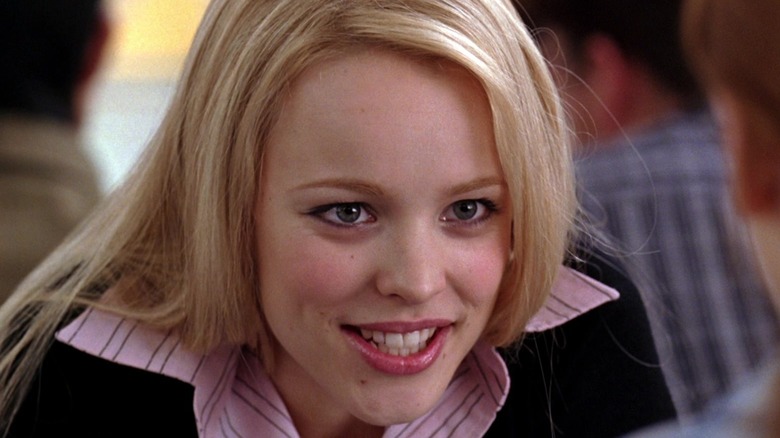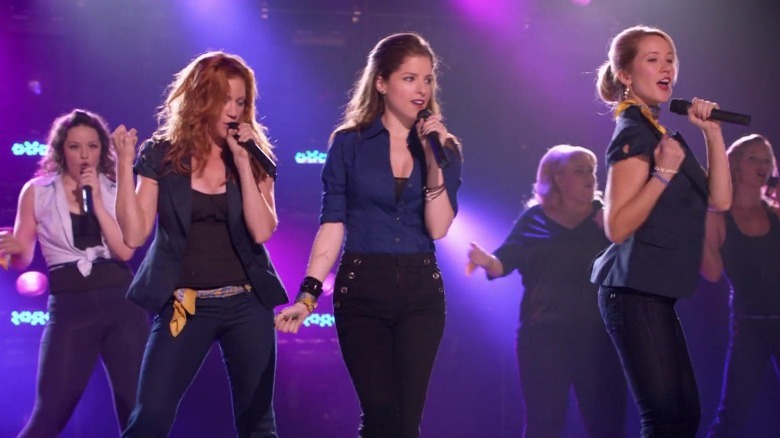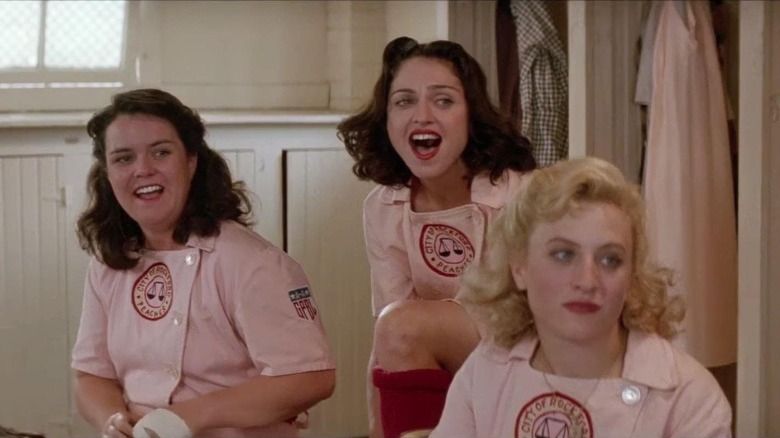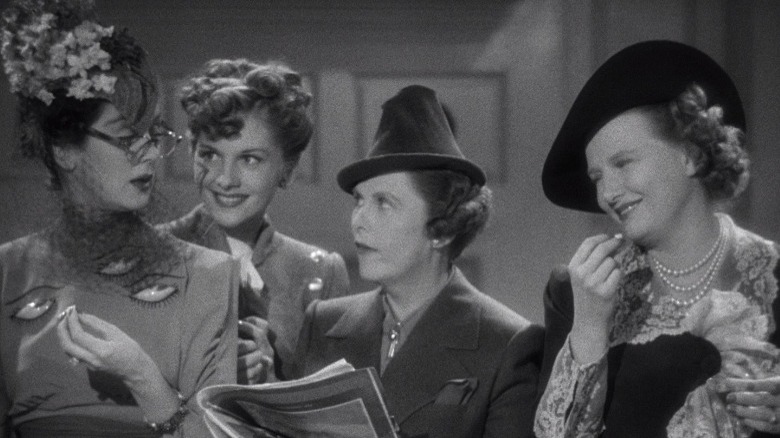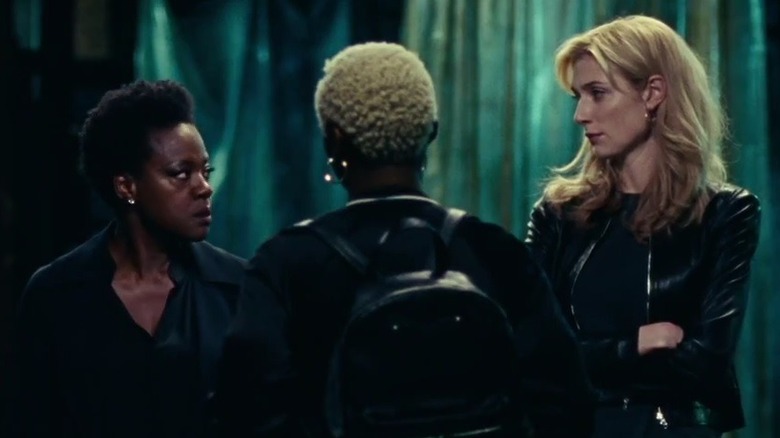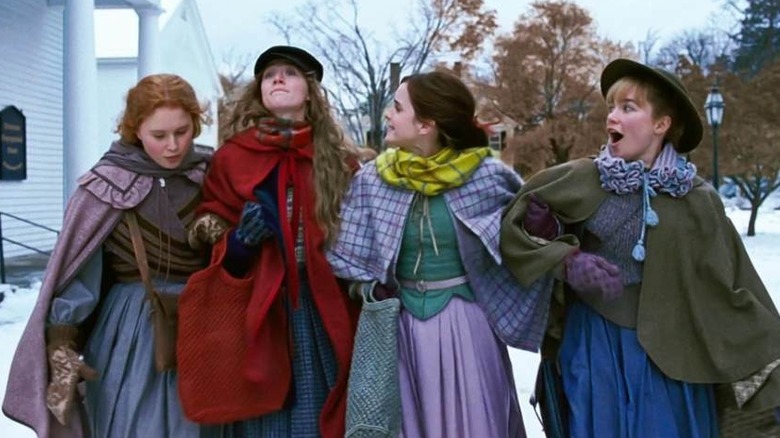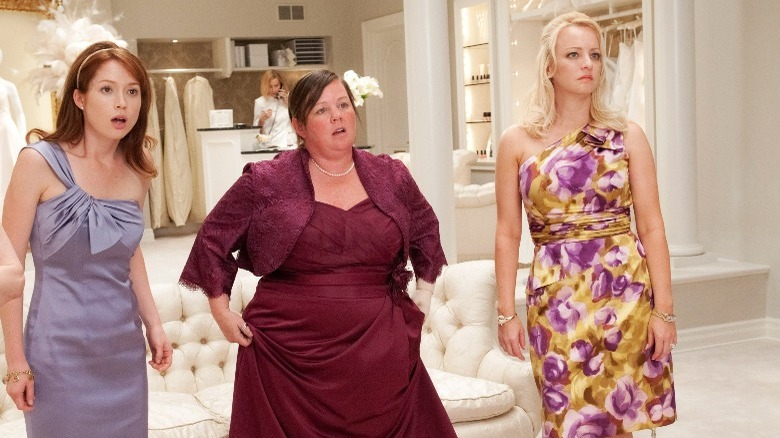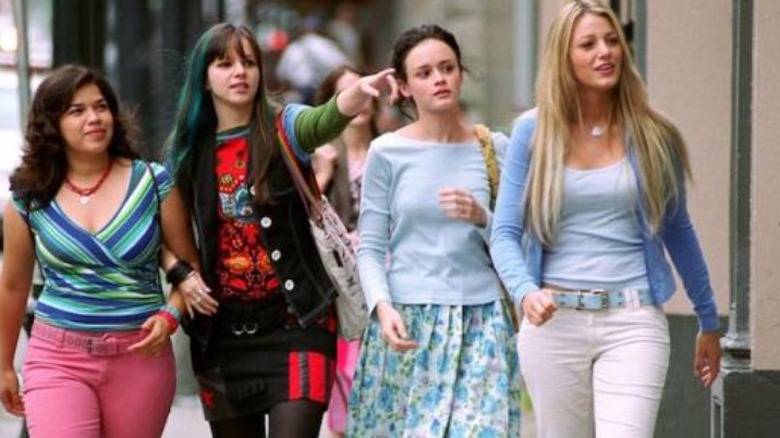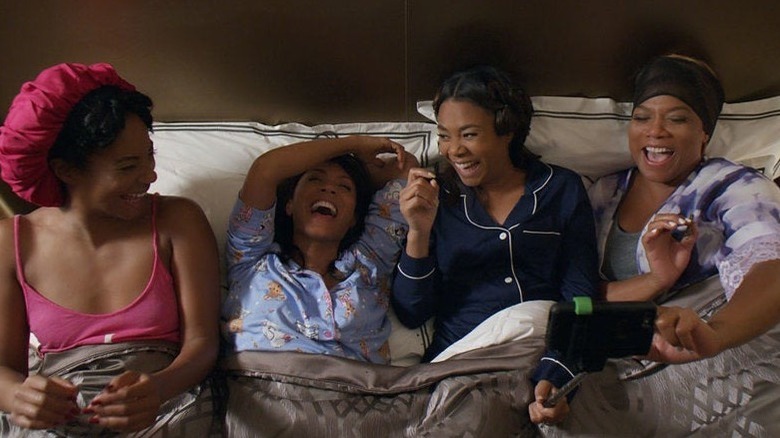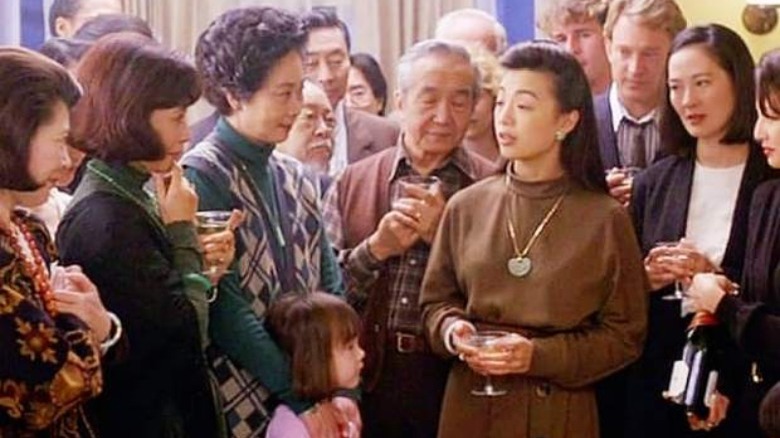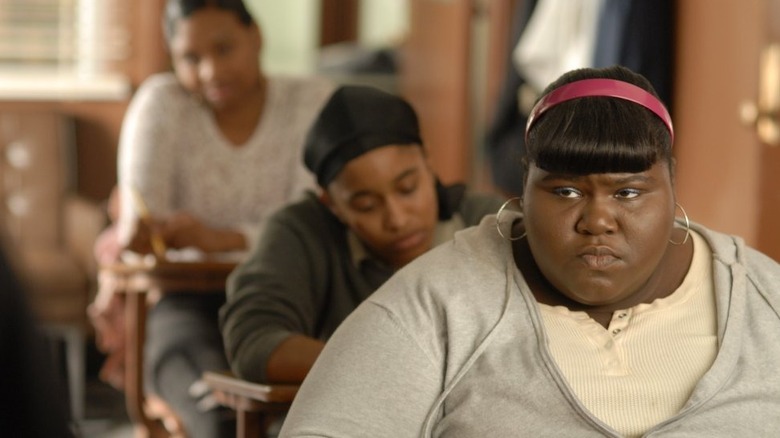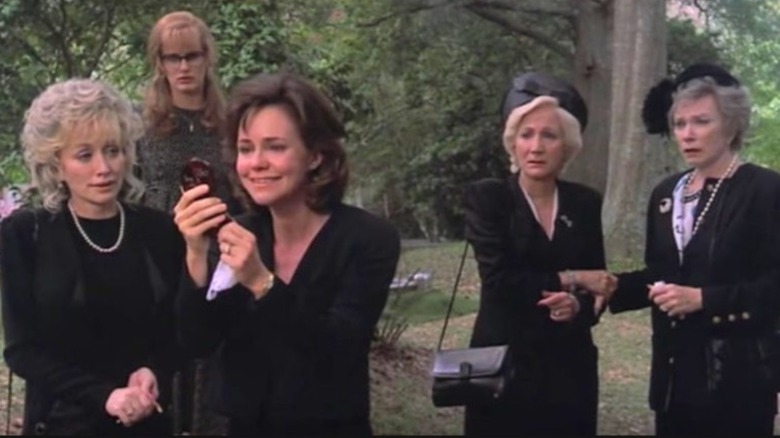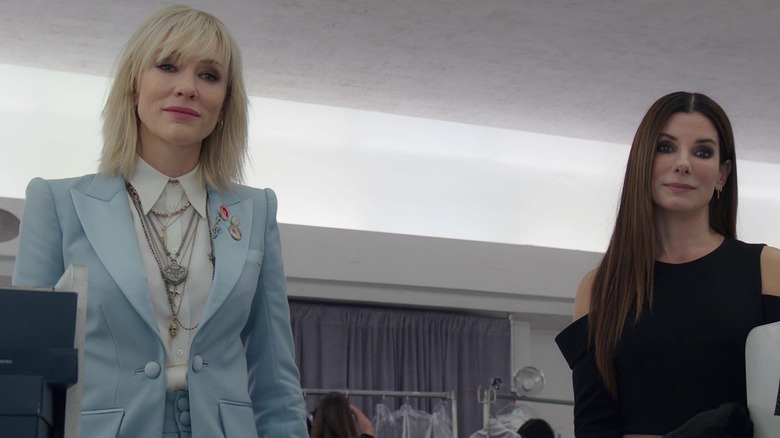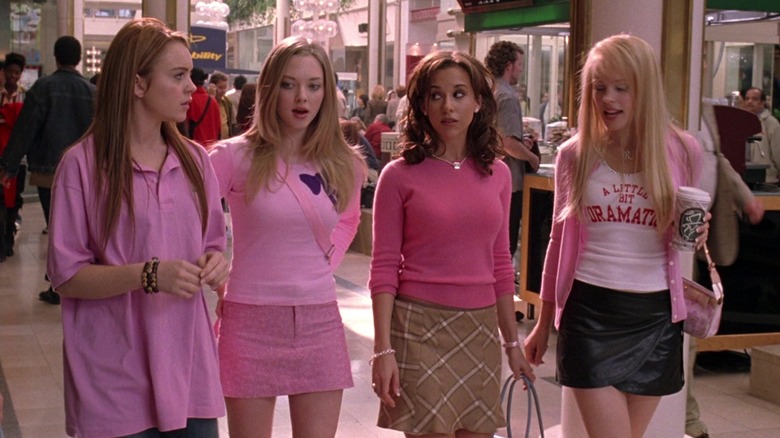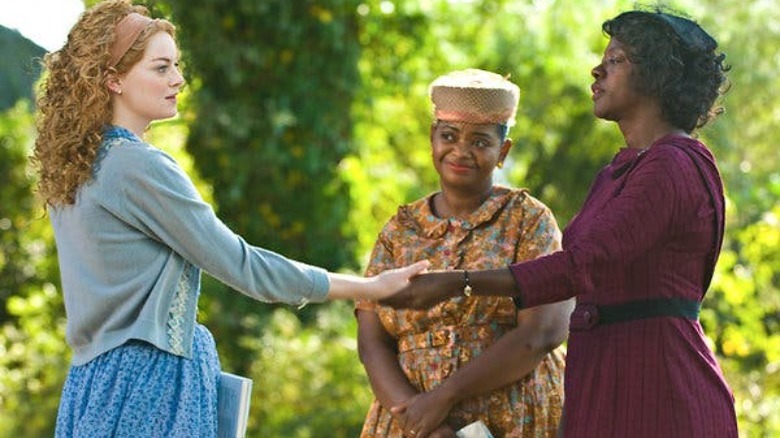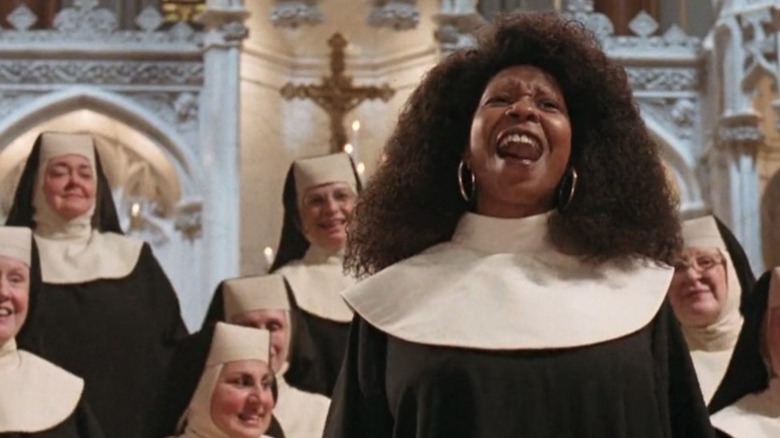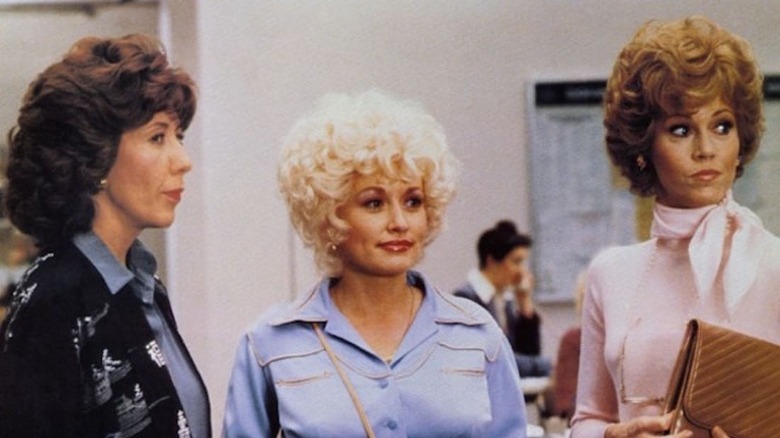Best Movies With All-Female Or Mostly Female Ensembles
January 2022 marks the release of "The 355," an action thriller featuring an ensemble of female spies led by Jessica Chastain. As such, we wanted to commend other great films with all-female or mostly female ensembles. These movies celebrate not only individual women but they highlight relationships between females. And though far too many films still center on the male experience, these are a collection of films that prove a focus on women can produce high-quality cinema.
In fact, it turns out that audiences are looking for just that when it comes to their movie-going experience. "The level of conversation is catching on, and people are becoming more aware of the imbalance that's happening on screen and behind the camera and starting to question why," explained "The Female Gaze" author Alicia Malone, to CNBC. "People are now demanding more, which is exciting," she added. On that note, all of the films on our list are fantastic examples of female-fronted cinema. These movies all feature casts with predominantly women in leading roles and emphasize the feminine experience in their stories. Here are the best movies with all-female or mostly female ensembles.
Pitch Perfect
What's better than a movie that promotes female bonding and the cultivation of strong friendships? A movie that does it with song, obviously. The 2012 film "Pitch Perfect" focused on the Barden Bellas, a struggling university acapella group looking to rebuild their image after an embarrassing championship performance the prior year. Remaining members Aubrey Posen (Anna Camp) and Chloe Beale (Brittany Snow) are forced to take on a whole new crew of girls, which includes Beca Mitchell (Anna Kendrick), a moody freshman with a brilliant head for mashups and a scene-stealing Rebel Wilson as Patricia "Fat Amy" Hobart.
There is nothing earth-shattering about "Pitch Perfect," but it is entertaining, comical, and sweet. Though there are a few male characters — played by the likes of Skyler Astin, Ben Platt, and Adam Devine, respectively — the focus is squarely on the Bellas. "As spirited and irresistible as the college a cappella craze it celebrates, 'Pitch Perfect' is a cheeky delight," declared Variety in their review. In fact, the original "Pitch Perfect" was such a big hit that it spawned two sequels — one in 2015 and one in 2017. There is also a "Pitch Perfect" TV adaptation on the way from Peacock (via The Hollywood Reporter), though no word yet on whether the show will be centered on a female singing group.
A League of Their Own
There have been plenty of fantastic sports films, but few of those have centered on female athletes. And that is but one reason why the 1992 movie "A League of Their Own" is noteworthy, as the classic film is so much more than just a sports movie. It is also a female friendship comedy, a family drama, and a story filled with richly accurate historical elements. "A League of Their Own" is a fictionalized narrative based upon the All-American Girls Professional Baseball League (AAGPBL), which operated during World War II. Events are depicted through the eyes of Dottie Hinson (Geena Davis), who, at the start of the film, has arrived at a 1988 exhibit at the Baseball Hall of Fame. We then flashback to 1943, where we see how the AAGLBL developed and how the women on the team created strong friendships in a time of crisis.
In addition to Dolly, the team also included Dottie's bratty younger sister Kit Keller (Lori Petty), wisecracking Doris Murphy (Rosie O'Donnell), and the sexy Mae Mordabito (Madonna). Many other female characters rounded out the cast, with Tom Hanks (as manager Jimmy Dugan), Jon Lovitz (as baseball scout Ernie Capadino), and Garry Marshall (as team owner Walter Harvey) as the sole male actors of significance. "What's fresh are the personalities of the players, the gradual unfolding of their coach, and the way this early chapter of women's liberation fit into the hidebound traditions of professional baseball," wrote Roger Ebert in his Chicago Sun-Times review.
The Women
We could not have a list of female-ensemble films without giving a nod to 1939's "The Women," one of the earliest examples of a female-led, female-written film. Based on a play of the same name, "The Women" is about Manhattan socialites, their lives, and the lives of those around them. It is set both in New York City, as well as Reno, where many of the women go to acquire divorces. With all of the gossip, infidelities, and divorces, "The Women" is basically "The Real Housewives" if the Housewives had existed in the 1930s.
The entire cast — more than 130 speaking characters — is female, led by stellar actresses Norma Shearer (as Mary Haines), Joan Crawford (as Crystal Allen), and Rosalind Russell (as Sylvia Fowler). "We don't know when we've ever seen such a terrible collection of women," wrote The New York Times in their 1939 review. "They're really appallingly good, and so is their picture."
Widows
Based upon a 1983 British television series, the 2018 movie "Widows" is a great example of a female-fronted cinematic win. The movie is about four women who are bonded by the debts of their dead husbands and who must enter into crime themselves to be able to repair their husband's mistakes. Viola Davis plays Veronica Rawlings, the widow of the gang's leader and the woman who is being threatened by crime boss Jamal Manning (Brian Tyree Henry). With a plan developed by her deceased husband, she enlists fellow crime widows Linda (Michelle Rodriguez) and Alice (Elizabeth Debicki), as well as her babysitter Belle (Cynthia Erivio), to help in her heist.
All-female crime thrillers are much rarer than comedies, so there's not a ton of competition in the area, but we still maintain that this is one of the better crime movies featuring women as the main characters (take the lesser quality "The Kitchen," for example, which came out a year later). "In the era of gender-reversal reboots and girl-power IP, the Steve McQueen heist is an exhilarating film that just happens to star women. We could use many more of those," wrote The Ringer. We could not agree more.
Little Women
Realistically, we could have included any number of the seven film adaptations of "Little Women" on this list, but we went for Greta Gerwig's 2019 version, which is not only the most recent but is also possibly the best. And as the title of the coming-of-age drama suggests, it's a tale about, well, women — namely the four March sisters. Led by fiercely independent and free-thinking writer Jo (Saoirse Ronan), the four sisters navigate life and love in 17th century England. Men are side characters in this story — which is really about Jo and her sisters Meg, Amy, and Beth – and love is not the main plot point.
Gerwig's "Little Women" was nominated for a slew of awards, including six Oscars. And while it only won one Academy Award (for costumes), don't let that fool you into sleeping on its greatness. The actresses are incredible, and there is a reason this story has hung around for more than a century and a half. Plus, Gerwig's version is told in a nonlinear fashion, changing up what others have done with the material. "Purists might blanche at the strenuously modern brand of feminism the movie imposes here, and the generally contemporary air that swirls over all its carriages and top hats," wrote Entertainment Weekly's reviewer. "If Gerwig's woke Women-hood verges on anachronism, though, it also feels fully loyal to the spirit of Alcott, a woman always well ahead of her time."
Bridesmaids
We are going to make a big declaration here, but "Bridesmaids" may be one of the funniest all-female comedies of all time. The 2011 film –- which was notably also written by two women, Annie Mumolo and Kristin Wiig –- assembled a cast of gifted comedic actresses and let them run free with the often-ridiculous material. From bride-to-be Lillian Donovan (Maya Rudolph) pooping in her wedding dress in the middle of the street, to maid-of-honor Annie Walker (Kristen Wiig) sneaking into first class while under the influence, "Bridesmaids" is full of laugh-out-loud moments and even a few heartwarming ones.
In addition to Lillian and Annie, the female ensemble here includes Helen Harris (Rose Byrne), who is Annie's competition for Lillian's best friend throne, and her other bridesmaids Rita (Wendi McLendon-Covey), Becca (Ellie Kemper), and Megan (Melissa McCarthy). McCarthy, in particular, wowed audiences with her turn as tough-talking, big-hearted Megan, but the magic of the picture was really the dynamic between the entire crew.
Though many male critics attempted to compare the film to the all-male fronted alternatives like "The Hangover" (see: CNN's review here), we like what critic Amy Biancolli wrote best. "Let's try to give [the term] 'chick flick' the boot; from now on, I won't use it if you won't," said Biancolli in her San Francisco Chronicle review. "And let no one apply it to Bridesmaids, a film of great hilarity, humanity, idiosyncrasy and grade-A, eyebrow-singeing raunch."
The Sisterhood of the Traveling Pants
Rarely do young adult films have the cultural impact of "The Sisterhood of the Traveling Pants," which people still talk about more than 15 years after its 2005 release. The coming-of-age film is a poignant, enjoyable story about four best friends and a magical pair of pants that mysteriously fits all of their very different body types. The teens share the pants, shipping them back and forth, as they spend the summer apart for the first time. Each girl has different lessons to learn and struggles to overcome — which they do, with the support of a special pair of jeans and a special group of friends.
One of the girls, Carmen Lowell (America Ferrera), must find her place in a blended family she barely knows, while another, Bridget Vreeland (Blake Lively), struggles with depression after sleeping with a coach at soccer camp. A third "sister," Lena Kaligaris (Alexis Bledel), finds love with a forbidden man in Greece, and the final one, Tibby Tomko-Rollins (Amber Tamblyn) learns compassion when she befriends a dying young girl she meets at her department store job.
There are males in the film, sure, but none of them matter much; it is all about the way the girls come together to help each other navigate their issues (and a little about those jeans). "It sounds like a touchy-feely Gap commercial, but this fantastical premise jars with a refreshingly realistic look at girls making the tricky transition to womanhood," wrote the BBC in their review of the film.
Girls Trip
When it comes to fun female buddy comedies with all sorts of out-there shenanigans, "Girls Trip" is up there at the top of the list with "Bridesmaids," "Booksmart," and "The Heat," amongst other favorites. And if for nothing else, we will forever be grateful to the team behind "Girls Trip," because it put Tiffany Haddish onto the mainstream's radar. But Haddish aside, there is a ton to love here in this ensemble comedy fronted by four hilarious Black women. "For the most part, "Girls Trip" balances sincere sentiment and boisterous comedy with honesty and skill, and for people who like their comedy a little nasty, this one's a blast," wrote the San Francisco Chronicle's longtime film critic Mick LaSalle.
Regina Hall stars as Ryan Pierce, a bestselling author who, feeling like she has drifted with her friends, invites them along on a trip to a musical festival where she will be delivering a keynote speech. Her friends include loudmouth gossip reporter Sasha Franklin (Queen Latifah), neurotic divorced mom and nurse Lisa Cooper (Jada Pinkett Smith), and happy, unpredictable party girl Dina (Haddish). There are fights and clashes along the way, but the women emerge at the end of the film with a newly rekindled and fully flourished friendship. "The bond between the four women – and occasional lack thereof – demands repeat viewing much more than the sporadic shocks of gross-out (and grapefruit) humor," wrote IndieWire in their review.
The Joy Luck Club
"The Joy Luck Club" is unique in that, not only is it an intergenerational tale featuring all female characters, but it is also a rare film centering on the Asian American immigrant experience. The 1993 drama, based upon a novel of the same name, focuses on four Chinese immigrant mothers living in San Francisco, each one with a Chinese-American adult daughter of her own. The older women bond over mahjong and food, but the best part of the film is in the relationships between mothers and daughters. These are fraught with tension over the conflict of two competing cultures and an inability to fully see one another.
"Agents of S.H.I.E.L.D." actress Ming-Na Wen led the stellar cast as June Woo, one of the daughters, but the power of the film goes beyond any individual actress. Critics were largely supportive of the film, and the National Board of Review named it a top 10 film for 1993. "This heartrending and transcendent adaptation of Amy Tan's bestseller about a quartet of Chinese American daughters and their immigrant mothers is the ultimate movie about almost everyone's first love: Mom," wrote the Philadelphia Inquirer's reviewer. As legendary critic Gene Siskel said in his Chicago Tribune critique of the film, "The film undoubtedly will speak to mothers and daughters of any nationality."
Precious
"Precious" is different from most of the films on our list, as the central relationship is one devoid of any underlying love and respect, which makes it somewhat difficult to watch. Nonetheless, it is an incredibly important film with a strong voice, incredible performances, and a devastating story arc. And though there are a few men in the film — hi, Lenny Kravitz as a sexy nurse — it really relies on the mostly-female ensemble to keep the wheels greased. In his 2003 review, Rolling Stone's expert reviewer Peter Travers declared, "'Precious' is an emotional powerhouse, a triumph of bruising humor and bracing hope that deserves its place among the year's best films." The film was nominated for six Academy Awards, winning two.
Based on a novel by author Sapphire, "Precious" is the story of Claireece "Precious" Jones (Gabourey Sidibe), a teenage girl living in a family in poverty and a home filled with all sorts of abuse. Her father raped and impregnated her twice, her mother verbally and physically abuses her, and despite being 16, Precious cannot read nor write at the beginning of the film. With no love from her mother Mary Lee Johnston (Mo'Nique), Precious must find scraps of support elsewhere — notably from a loving teacher, Blu Rain (Paula Patten), her all-female classmates, and a social worker named Ms. Weiss (Mariah Carey).
Steel Magnolias
No doubt about it, "Steel Magnolias" is the schlockiest film on our list of movies with female-led ensembles. It is by no means a "cool" movie — it wasn't back when it came out in 1989, and it certainly is not now. But there is a reason this story has resonated with people for over three decades, since it started as a play in 1987. It is a tale about friendship, family, love, grief, abuse, grace, social support, and so much more. Though "Steel Magnolias" is melodramatic and over-the-top, the female actors will make you feel deep feelings, and that's a sign of its greatness.
The ensemble is led by Sally Field as M'Lynn Eatenton, a social worker and overbearing mother to three, including Shelby (Julia Roberts), who suffers from type-1 diabetes. The women spend much of their time at the beauty salon, being serviced by gossipy beautician Truvy Jones (Dolly Parton) and her new apprentice, shy Annelle Dupuy-DeSoto (Daryl Hannah). Best friends Clairee Belcher (Olympia Dukakis) and Ouiser Boudreaux (Shirley MacLaine) round out the primary cast. For better or worse, these women have roots that connect them on a deep level. "I doubt if any six real women could be funny and sarcastic so consistently (every line is an epigram), but I love the way these women talk," said Roger Ebert in his Chicago Sun-Times review.
Ocean's Eight
Much like its predecessors, "Ocean's Eleven," "Ocean's Twelve," and "Ocean's Thirteen," "Ocean's Eight" is a fun, flirty heist movie. But unlike those earlier films, "Ocean's Eight" relied on an all-female ensemble, with fantastic results. The film ranked in nearly $300 million worldwide, per Box Office Mojo. Clearly, the franchise's bankability was not reliant on the gender of its stars, nor did there need to be an especially strong connection to the original trilogy. Sandra Bullock's Debbie Ocean — sister to Danny Ocean (George Clooney) was the link to the original ensemble.
Upon her release from prison, Debbie launches into a plan for a new heist. She is joined in her scheming by a group of fascinating women, including her old partner Lou Miller (Cate Blanchett), jewelry designer Amita (Mindy Kaling), hacker Nine Ball (Rihanna), and street pickpocket Constance (Awkwafina). The rest of the eight is made up of a spoiled actress (Anne Hathaway as Daphne Kluger), a shunned fashion designer (Helena Bonham Carter as Rose Weil), and a full-time mom and part-time fencer (Sara Paulson as Tammy). "The simple pleasure of seeing such stylish, charismatic actresses bounce off one another with naughty glee is enough for this film to fulfill its purpose," wrote The New Statesman in their review.
Mean Girls
There are a few males in 2004's "Mean Girls" – school heartthrob Aaron Samuels (Jonathan Bennett), gay best friend Damian Leigh (Daniel Franzese), principal Ron Duvall (Tim Meadows) — but the film is very much about the way that adolescent females interact with, talk about, and treat one another. The classic teen film centers on Cady (Lindsay Lohan), a teenager who has recently moved to the United States from Africa and who must learn the customs of American high school. There to usher her into the fold are the mean girls — otherwise known as "the plastics" – Regina George (Rachel McAdams), Karen Smith (Amanda Seyfried), and Gretchen Wieners (Lacey Chabert).
"Mean Girls" offers a scathing commentary about teenage girls and social aggression, as well as high school social hierarchies more generally. It's also incredibly funny, with solid performances and enough of a "lesson" to register but not feel too heavy-handed. The Telegraph wrote that "Mean Girls" "fizzes with peculiarly feminine evil, of the kind that comes dripping through a pillowy smirk garnished with baby-pink lipgloss," while the SFGate said that it was "a smart little comedy that tries, within the limits of the teen-movie form, to say some real things about high school girls and the struggle for popularity."
The Help
"The Help" is not a perfect movie – USA Today, Time, and others have critiqued its inauthentic portrayal of race relations and racism, for example — but it is an enjoyable film with standout performances from a mostly-female cast including Viola Davis, Jessica Chastain, Emma Stone, Bryce Dallas Howard, and Octavia Spencer, who won an Oscar for her performance. The movie, which focuses on Black maids and their white employers in 1960s Jackson, Mississippi, is based upon a popular novel of the same name.
And yes, "The Help" features a white woman, Skeeter Phelan (Stone), at the center of the narrative, but the relationships between the women — Skeeter and Aibileen Clark (Davis), Aibileen and Minny Jackson (Spencer), Minny and Celia Rae Foote (Chastain) — are dynamic and complex. Issues aside, "The Help" was a well-received film that earned four Academy Award nominations when it came out in 2011. Critical and audience responses were generally favorable to the female-fronted film. As Entertainment Weekly's movie critic wrote in his review, "The movie isn't perfect; it sometimes shows its stitching. But mostly it's a stirring salute to subjugated women who hold their heads high."
Sister Act
"Sister Act" is perhaps one of the most fun movies Whoopi Goldberg has ever made — and it is certainly a female-focused film, given that nearly every main character is a woman of faith. In the 1992 film, Goldberg plays Deloris Van Cartier, a Reno, Nevada, singer who witnesses a murder and is subsequently placed in witness protection. Her new identity is that of a nun — Sister Mary Clarence — and her hideaway is a San Francisco convent.
Deloris turns the convent on its head, helping the nuns to find their voices (literally and figuratively) as the head of the choir. In turn, the nuns impact Deloris with their unwavering kindness and loyalty. Though this is very much Goldberg's movie, the entire ensemble — from Maggie Smith as the Reverend Mother to Kathy Najimy as bombastic Sister Mary Patrick to Wendy Makkena as shy Sister Mary Robert — shines. "The script ... has two or three inspired one-liners (enough to distract you from the clanky machinery of the plot), but it's Whoopi and the girls who keep this confection tasty," said Newsweek.
9 to 5
Few Hollywood friendships make us as giddy as the one between Jane Fonda and Lily Tomlin. Throw in their old pal Dolly Parton, and it just doesn't get better. So, naturally, their 1980 classic film "9 to 5" had to be on our list of top female-fronted films. The movie is about three female employees who take revenge on their sexist, egotistical boss (played by Dabney Coleman). Fonda plays former housewife and new worker Judy Bernly, while Tomlin's Violet Newstead is a seasoned worker who is consistently overlooked and treated as less than her male peers. And Parton's Doralee Rhodes is perhaps the most put-upon — a secretary who is subject to sexual harassment and vicious workplace rumors.
The film was Parton's first, and she proved that she could hold her own amongst acting heavyweights Fonda and Tomlin. And it is the chemistry between the three women that makes this dark comedy work so well. The Los Angeles Times said, "In short, its stars are more satisfying than their material, as good as it so often is," and the Irish Times declared the women "one of cinema's most badass trios."
